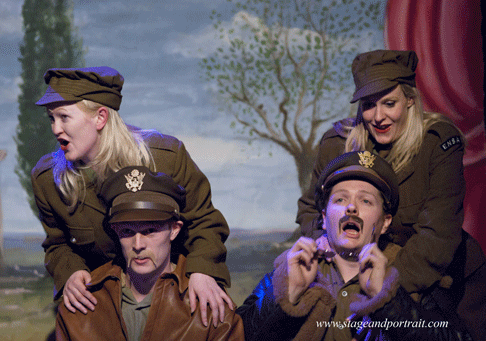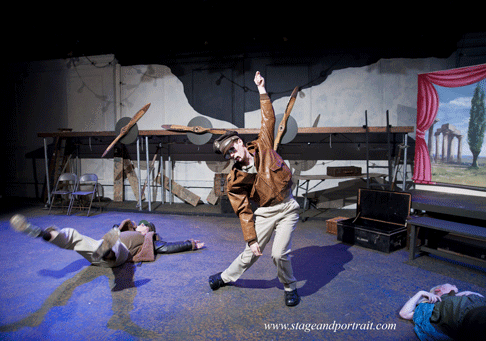Daisy Evans, who directed CosÏ fan tutte for Hampstead Garden Opera, had the
wonderfully inspired idea of setting it in Sicily, in October 1943, at the
height of the Allies’ Italian campaign. Ferrando and Guglielmo become two
young British lieutenants, briefly on leave from the front on the mainland, and
Fiordiligi and Dorabella two giddy members of an Entertainments National
Service Association (ENSA) concert troupe sent out to divert the Allied
soldiers. By this historical juncture British and American troops were fighting
together, and this provides Ferrando and Guglielmo with a good reason to
disguise themselves as Americans. Evans describes the scenario in her
“Director’s Note” as “a micro society built far from
home with people you’d never normally encounter, where motivation, morals
and hope become plastic, changeable and precarious.” It’s all very
convincing.
I was reminded of Kenneth Branagh’s sadly underrated cinematic
updating of Love’s Labour’s Lost, set in the late 1930s
with the threat of war looming over Europe — not least because of the
striking parallels between Shakespeare’s very unconventional comedy and
Mozart’s opera. In both cases the introduction of the realities of war
gives an “edge” to proceedings often represented as unfolding in a
dreamy never-never space, while also, paradoxically, somehow justifying any
silliness that does not involve mass slaughter.
Evans’s concept works brilliantly in every respect, and I have no
hesitation declaring this the most dramatically solid CosÏ I’ve
seen. In the original Da Ponte opera, the decision of Ferrando and Guglielmo to
disguise themselves as bushily-moustached Albanians who happen to speak perfect
Italian is basically farcical, very much like the lovers pretending to be
Russians in Love’s Labour’s Lost. One feels they could be
from any country, for all that it matters; one cannot imagine the mere fact of
their being Albanian adding to their attraction. By contrast, in the Hampstead
Garden Opera production the decision of the lovers to impersonate Americans has
real point, and the lines about moustaches are actually funnier — at
least if you’re British. In seeming to be Americans, Ferrando and
Guglielmo are seen to have an immediate advantage over their British
counterparts: they are wealthier, better dressed, more confident, gung-ho and
“with it.” They have wonderful things like chocolate and nylon
stockings, and can advertise their sexual prowess through raunchier modes of
dancing. From the moment they first appear it is obvious the “real”
Ferrando and Guglielmo are involved in an unequal struggle. Theatrically
speaking, too, the old clichÈ about two countries divided by a common language
allows for plenty of fun, in general the attempts at American pronunciation
being (I take it) deliberately bad and inconsistent.
 (Left to right) Sarah Denbee (Dorabella), Henry Manning (Guglielmo), Zachary Devin (Ferrando), and Maud Millar (Fiordiligi)
(Left to right) Sarah Denbee (Dorabella), Henry Manning (Guglielmo), Zachary Devin (Ferrando), and Maud Millar (Fiordiligi)
The production utilizes an English translation by Martin Fitzpatrick,
tweaked here and there to reference the 1940s situation. It is beautifully
idiomatic and faithful to the music’s rhythms; this, in combination with
the clear articulation of the singers, made it remarkably easy to hear almost
every word. And it was worth paying attention, for line after line had the
audience indulging not just in polite chortles but unrestrained hilarity. Two
examples from Despina: “What do you think your lovers will do on
‘active service’?”; “Eat up the pasta, but leave room
for the salami!” Examples of sensitive modernizing include Ferrando and
Guglielmo telling Don Alfonso “You’re a bitter old cynic. / You
should be in a clinic” and “I think we’ll hit the
jackpot.” One line which caught everyone’s attention was
Guglielmo’s describing Fiordiligi as a “faithless, double-crossing,
deceitful, lying bitch!” While Italian “cagna” does
translate as “bitch,” in the original it is merely the last in a
string of nouns, some of them rather past their sell-by date. The piling up of
adjectives in the English made the b-word far more emphatic; the fact that it
seemed more likely to be spoken by Guglielmo’s assumed American character
made the rhetorical moment a memorable coup de thȂtre.
The thoroughly entertaining and easily accessible dialogue, the irresistible
buffoonery surrounding the “American” imposture, the well-judged,
hammy performances by the sisters, who gave the general impression of feeling
lucky that they had men at all, let alone two each, and the bounce and verve
which Hampstead Garden Opera brought to the whole performance, made it
difficult to remember that Mozartean opera is often disparaged as an elitist
pastime even by people who like Shakespeare, or who will queue in the rain for
a Leonardo da Vinci exhibition. There was nothing elitist about this
production. It was popular Mozart, but not dumbed down Mozart, and in fact more
intellectually engaging than many a “classic” production in the
original language. (When he directed a landmark Magic Flute in English
in 1911, Edward Dent argued that there were no limits to the potential
popularity of Mozartean opera in Britain, provided it were performed in good
translations — I’m now convinced he was right.) A glance around the
utterly unpretentious Upstairs at the Gatehouse theatre revealed a very diverse
audience of the young and old, fashionable and unfashionable, and (I would
guess) very different income levels. A deep and unforced sense of pleasure
appeared to be general.
In productions like this, put together on shoestring budgets, goodwill and
enthusiasm, it is of course unreasonable to expect the very highest musical
standards. But that acknowledged, the level was remarkably high, and one would
have needed a fastidious ear or uncompromising “professional”
standard to go home feeling unsatisfied. The six principals were all
outstanding, and if their singing tended to the robust rather than the subtle,
this fitted the generally spirited nature of the production. They all possessed
a strong stage presence, displayed fine acting skills, and brought an
infectious zest to everything they did.
 Zachary Devin (Ferrando), Henry Manning (Guglielmo, and Sarah Denbee (Dorabella)
Zachary Devin (Ferrando), Henry Manning (Guglielmo, and Sarah Denbee (Dorabella)
The musical director was Dorian Komanoff Bandy, who has undertaken extensive
research into historical performance practices in Mozart’s operas and
brings the results to this particular production. I can do no better than quote
his own account: “In our production of CosÏ, we see the musical
text not as a finished document, but as a starting point. True to 18th-century
practices, cadenzas will be fitted to the individual singers, and will vary
with each performance. Ornamentation will likewise be mostly unpremeditated.
Even my recitative continuo, which I will play on a fortepiano similar to
Mozart’s, will be active and pervasive, participating in the dramatic
action rather than accompanying it. (Would Mozart, the great showman, have sat
idly at the keyboard and strummed chords only at cadences?)” I am not
qualified to comment on the historical claims made here, but there was no
arguing with the fact that the approach brought the music to life in a way
which suited the production perfectly. Komanoff Bandy’s palpable passion
for what he was doing matched that of the principals on stage, and he secured
some very fine playing from his little orchestra. Tempos were fast, but not
excessively so, and the music bristled with energy, conveying a general sense
of urgency and agitation appropriate to the unstable wartime scenario. This was
not the “Classical” or even the “Romantic” Mozart, but
it was an unquestionably theatrical Mozart.
It is worth adding, in conclusion, that Hampstead Garden Opera, founded in
1990, has always had a special affinity for Mozart. In fact the company was
established specifically with a view to performing his operas, and though they
have gone on to explore the works of many other composers, they have kept
returning to Mozart. But in the past they have focused mainly on Don
Giovanni, Figaro, and The Magic Flute. This is only the
second time they have presented CosÏ fan tutte, making it all the more
praiseworthy that they have pulled off such a bold and successful
reinterpretation.
David Chandler
Cast
image=http://www.operatoday.com/Cosi_HGO_Poster.gif
image_description=CosÏ Fan Tutte, Hampstead Garden Opera
product=yes
product_title=W. A. Mozart: CosÏ Fan Tutte
product_by=Ferrando: Zachary Devin; Guglielmo: Henry Manning; Fiordiligi: Maud Millar; Dorabella: Sarah Denbee; Despina: Marion Wyllie; Don Alfonso: Daniel Roddick. Hampstead Garden Opera. Conductor: Dorian Komanoff Bandy. Production Director: Daisy Evans. Artistic Director: Oliver-John Ruthven. Set and Costume Designer: Katherine Heath. Upstairs at the Gatehouse, Highgate, London, 3 May 2012.
product_id=Photos by Laurent Compagnon courtesy of Hampstead Garden Opera